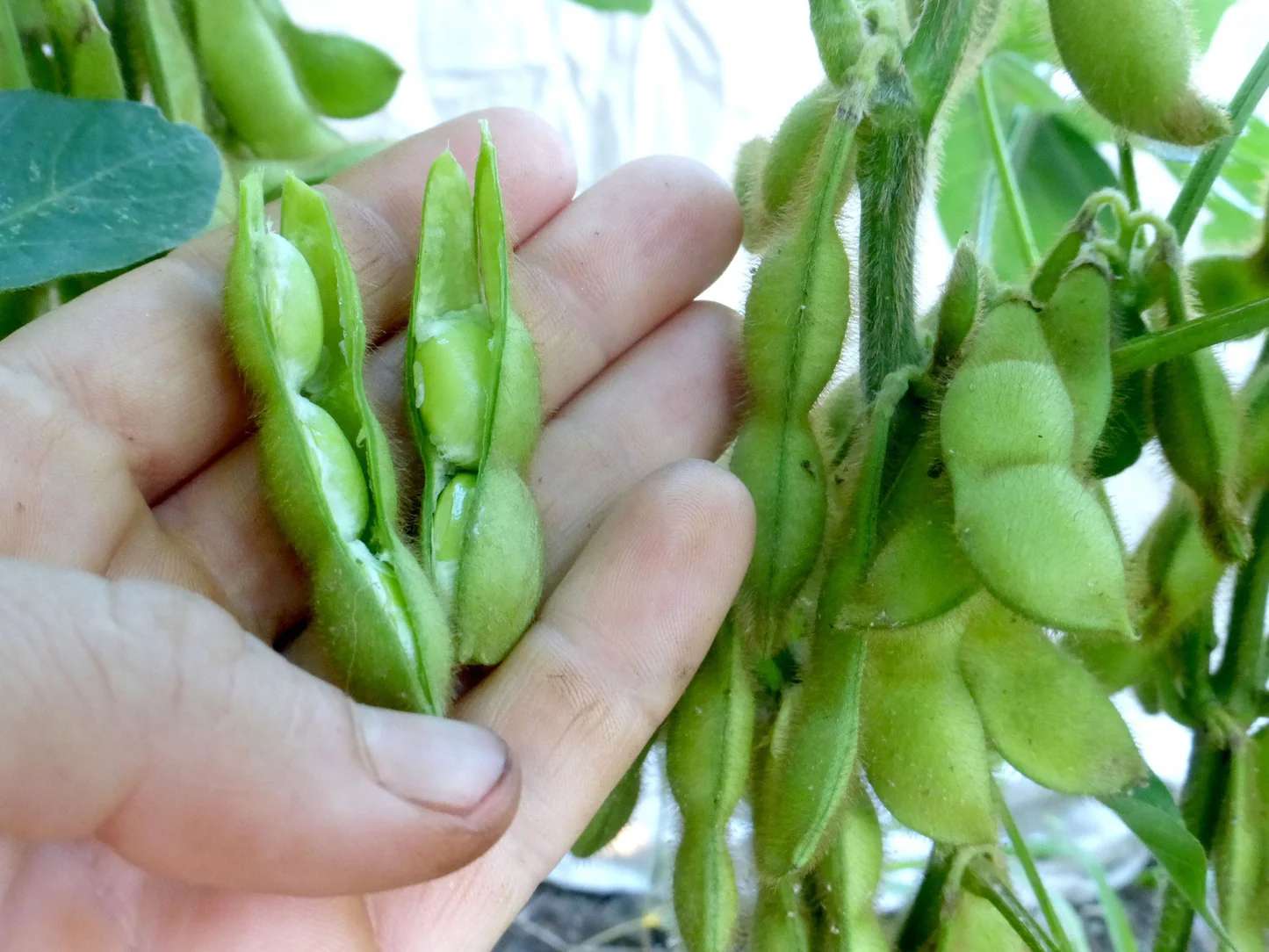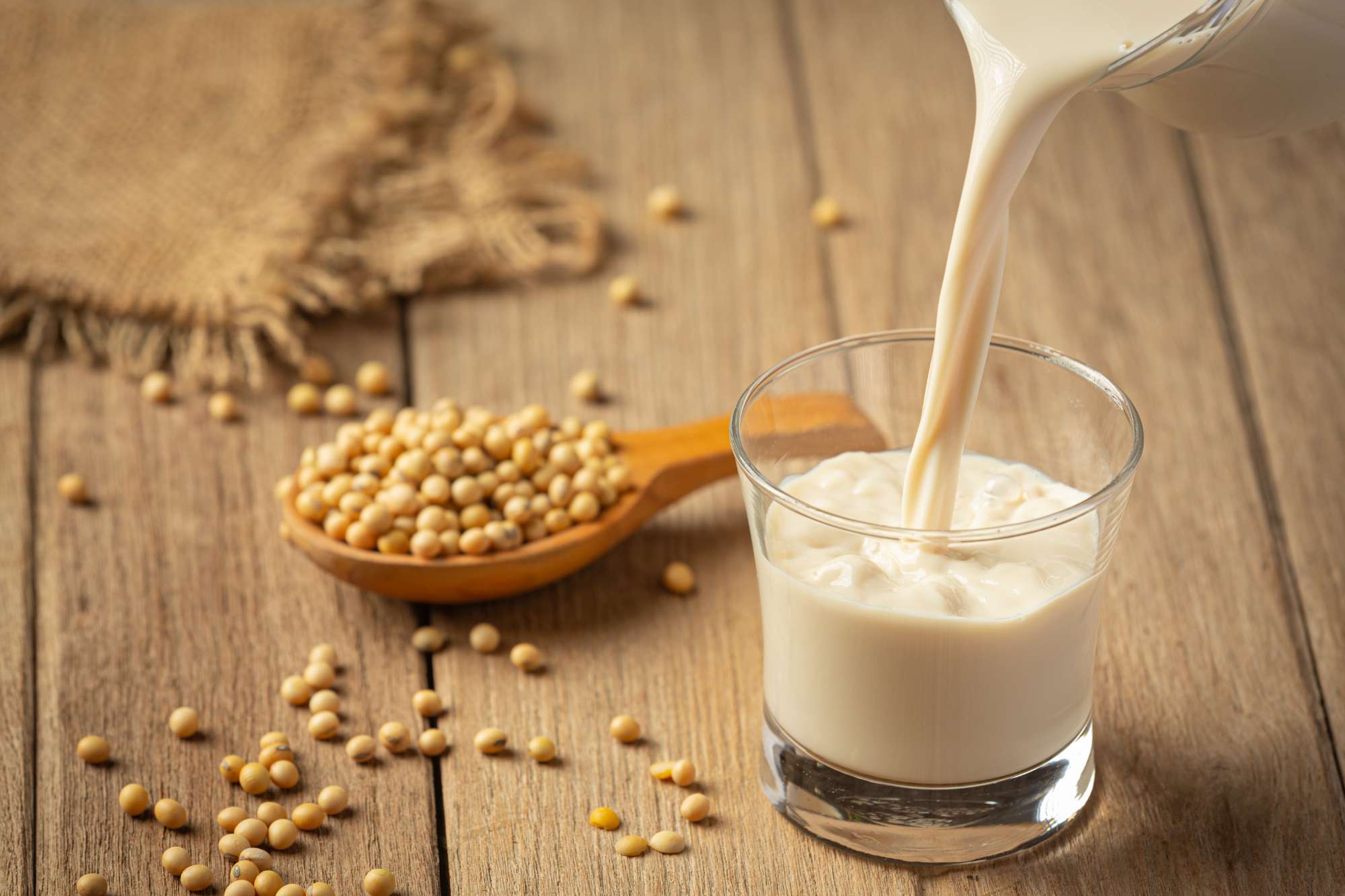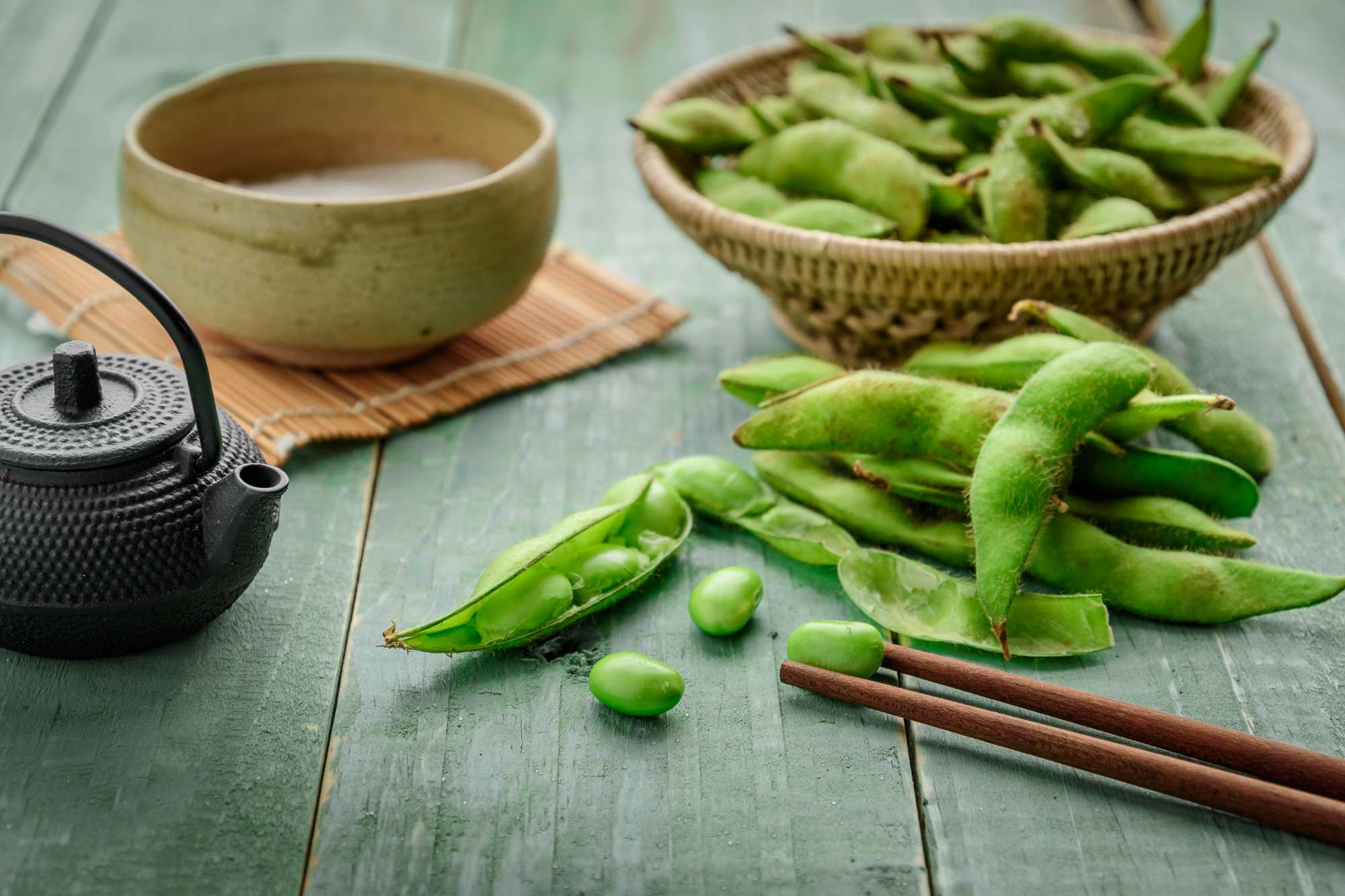Soybeans and Isoflavones, a health boosting duo
Soybeans and Isoflavones, a health boosting duo
Soybeans is a presentation of a potent source of plant-based protein. And more, it contain antioxidants and phytonutrients that are linked to various health benefits. They may reduce the risks of cancer and alleviate menopause symptoms. But, it also concerns have been raised about potential adverse effects.
Soybean or soya bean (Glycine max) is a legume native to East Asia, widely grown for their edible seeds, which have many uses. Soybeans contain large amounts of phytic acid, dietary minerals and B vitamins.
In cuisine, the most commonly used products today are
- Soybean oil
- Soy sauce, a fermented sauce made from soybeans
- Soy milk, a beverage made from soybeans
- Soy protein, a protein derived from soybeans

.jpg)
NUTRITIONAL VALUE PER 100GRAMS (G) OF RAW SOYBEAN
1. Energy: 1,866 kJ (446 kcal).
2. Plant compounds
Soybeans are rich in various bioactive plant compounds, including:
- Isoflavones
A family of antioxidant polyphenols, isoflavones have a variety of health effects. The three main isoflavones found in soybeans are:
• Genistein, get 50%, it considered the most potent isoflavone.
• Daidzein, get 40%, this is another important isoflavone with antioxidant properties.
• Glycitein, get 10%, present in smaller amounts compared to genistein and daidzein.
- Phytic acid
Found in all plant seeds, phytic acid (phytate) impairs the absorption of minerals like zinc and iron. Levels of this acid can be reduced by boiling, sprouting, or fermenting the beans.
- Saponins
One of the main classes of plant compounds in soybeans, saponins have been found to reduce cholesterol in animals.
3. Carbohydrates: 30.16g
- Sugars: 7.33g
- Dietary fiber: 9.3g
4. Fat: 19.94g
- Saturated: 2.884g
- Monounsaturated: 4.404g
- Polyunsaturated: 11.255g
+ Omega‑3: 1.330g
+ Omega‑6:9.925g

5. Protein: 36.49g
- Tryptophan: 0.591g
- Threonine: 1.766g
- Isoleucine: 1.971g
- Leucine: 3.309g
- Lysine: 2.706g
- Methionine: 0.547g
- Cystine: 0.655g
- Phenylalanine: 2.122g
- Tyrosine: 1.539g
- Valine: 2.029g
- Arginine: 3.153g
- Histidine: 1.097g
- Alanine: 1.915g
- Aspartic acid: 5.112g
- Glutamic acid: 7.874g
- Glycine: 1.880g
- Proline: 2.379g
- Serine: 2.357g
Soy is a good source of protein for vegetarians and vegans or for people who follow plant - base diet.
Most soybean proteins are storage proteins that are relatively heat-stable. This allows food products that require high-temperature cooking to maintain protein stability.
Although soybeans have high protein content, soybeans also contain high levels of protease inhibitors, which can prevent digestion. Protease inhibitors are reduced by cooking soybeans, and are present in low levels in soy products such as tofu and soy milk.
6. Vitamins
- Vitamin A equiv.: 1μg, 0%DV† (daily value)
- Thiamine (B1): 0.874mg, 73%DV†
- Riboflavin (B2): 0.87mg, 67%DV†
- Niacin (B3): 1.623mg, 10%DV†
- Pantothenic acid (B5): 0.793mg, 16%DV†
- Vitamin B6: 0.377mg, 22%DV†
- Folate (B9): 375μg, 94%DV†
- Choline: 115.9mg, 21%DV†
- Vitamin C: 6.0mg, 7%DV†
- Vitamin E: 0.85mg, 6%DV†
- Vitamin K: 47μg, 39%DV†
7. Minerals
- Calcium: 277mg, 21%DV†
- Copper: 1.658mg, 184%DV†
- Iron: 15.7mg, 87%DV†
- Magnesium: 280mg, 67%DV†
- Manganese: %2.517mg, 109%DV†
- Phosphorus: %704mg, 56%DV†
- Potassium: 1797mg, 60%DV†
- Sodium: 2mg, 0%DV†
- Zinc: 4.89mg, 44%DV†
8. Other constituents
- Water: 8.54g
- Cholesterol: 0mg

HEALTH BENEFITS OF SOYBEANS
Like most whole foods, soybeans have a some of beneficial health effects.
1. May help prevent prostate cancer in men
Several studies have suggested the compounds in soybeans, particularly isoflavones, have been linked to a reduced risk of this disease.
While the exact mechanisms aren't fully understood, research suggests several ways soybeans products might contribute to prostate cancer prevention. The key player is Isoflavones:
- Hormonal balance:
Isoflavones, particularly genistein and daidzein, have weak estrogen-like properties. While this might raise concerns, these compounds primarily interact with estrogen receptors that are thought to have a protective effect on the prostate.
- Antioxidant properties:
Isoflavones are potent antioxidants, helping to neutralize harmful free radicals that can damage cells and contribute to cancer development.
- Anti-inflammatory effects:
Some studies suggest that soy isoflavones may possess anti-inflammatory properties, which could help reduce inflammation associated with prostate cancer.
- Cell growth regulation:
Isoflavones have been shown to inhibit the growth of prostate cancer cells in laboratory studies.
Other Potential Mechanisms
- Genistein:
This specific isoflavone has been found to interfere with the blood supply to tumors, potentially slowing their growth.
- Reduced insulin-like growth factor (IGF-1):
Some research suggests that soy consumption may lower IGF-1 levels, a growth factor linked to an increased risk of prostate cancer.
It's important to emphasize that while these findings are promising, more research is needed to fully understand the complex relationship between soybeans and prostate cancer. Individual variations in response to soybeans also exist.
2. Reduction breast cancer in premenopausal women
A number of soybeans compounds, including isoflavones and lunasin, are considered may he for the potential cancer-preventive effects. Exposure to isoflavones early in life may be particularly protective against breast cancer later in life.
There was once a misconception that soybeans, due to its phytoestrogen content, could potentially increase breast tissue and, consequently, breast cancer risk. This fear stemmed from the fact that estrogen can fuel certain types of breast cancer. Studies have analyzed that while they share some structural similarities, but phytoestrogens in soybeans are much weaker than the estrogen produced by the human body, and phytoestrogens unlikely to promote cancer risk.
Soybeans can actually reduce breast cancer risk. Many studies indicate that consuming soybeans products, especially whole soybeans foods like tofu, soy milk, may actually reduce the risk of breast cancer.
Keep in mind that while whole soybeans foods are generally safe, but soybeans supplements are different. Soybeans supplements which contain concentrated amounts of phytoestrogens, may have different effects. Some studies have suggested a potential link between high doses of soybeans supplements and increased breast cancer risk in women with specific genetic predispositions.
It's important to note that:
- Individual responses to soyneans can vary.
- If you have concerns about soybeans consumption, especially if you have a family history of breast cancer, it's advisable to consult with a healthcare professional.
- Enjoying soy products as part of a balanced diet is generally considered safe and may even offer health benefits. However, moderation is key, and individual factors should be considered.
3. Alleviation of menopause symptoms
Menopause is the period in a woman’s life when menstruation stops. It is often associated with unpleasant symptoms which are brought about by a reduction in estrogen levels. These symptoms often include hot flashes, night sweats, mood swings, and vaginal dryness. Interestingly, Asian women are less likely to experience menopause symptoms than Western women. That because of dietary habits, such as the higher consumption of soy foods in Asia.
Studies indicate that isoflavones, a family of phytoestrogens found in soybeans, may alleviate these symptoms.
It's important to note that:
- The effectiveness of soy isoflavones can vary from person to person, so that not all women respond the same way.
- Some women produce a compound called equol from isoflavones, which is thought to be more effective in reducing menopausal symptoms. Daily intake of 135 mg of isoflavones for 1 week, equivalent to 2.4 68 grams of soybeans per day, reduced menopausal symptoms only in equol producers.
While hormonal therapies have traditionally been used as a treatment for menopausal symptoms, isoflavone supplements are widely used today.
Even soybeans can be a beneficial addition to a menopausal woman's diet, it's essential to consider individual circumstances and consult with a healthcare provider for personalized advice.
4. Bone health
Osteoporosis is characterized by reduced bone density and an increased risk of fractures, especially in older women.
Consumption of soy products, particularly those rich in isoflavones, has shown promise in reducing the risk of osteoporosis in postmenopausal women. Isoflavones, with their estrogen-like properties, help to counteract the bone loss that often occurs after menopause.
However, it's important to note that while research is promising, individual responses can vary. A balanced diet rich in calcium and vitamin D, along with regular weight-bearing exercise, remains crucial for bone health.

CONCERNS AND ADVERSE EFFECTS
Even though soybeans have a number of health benefits, some individuals need to limit their consumption of soybeans products or avoid them altogether.
1. Suppression of thyroid function
High intake of soy products may suppress thyroid function in some people and contribute to hypothyroidism, a condition characterized by low production of thyroid hormones.
The thyroid is a large gland that regulates growth and controls the rate at which your body expends energy. Animal and human studies indicate that the isoflavones found in soybeans may suppress the formation of thyroid hormones.
One study in 37 Japanese adults showed that eating 30 grams of soybeans every day for 3 months caused symptoms related to suppressed thyroid function. The symptoms included discomfort, sleepiness, constipation, and thyroid enlargement — all of which disappeared after the study ended.
Another study in adults with mild hypothyroidism found that taking 16 mg of isoflavones every day for 2 months suppressed thyroid function in 10% of the participants. The amount of isoflavones consumed was rather small, equivalent to eating 8 grams of soybeans per day. However, most studies in healthy adults have not found any significant links between soy consumption and changes in thyroid function.
An analysis of 14 studies noted no significant adverse effects of soybean consumption on thyroid function in healthy adults, whereas infants born with thyroid hormone deficiency were considered at risk.
In short, regular consumption of soy products or isoflavone supplements may lead to hypothyroidism in sensitive individuals, especially those who have an underactive thyroid gland.
2. Flatulence and diarrhea
Like most other beans, soybeans contain insoluble fibers, which may cause flatulence and diarrhea in sensitive individuals. Although not unhealthy, these side effects can be unpleasant.
Belonging to a class of fibers called FODMAPs, the fibers raffinose and stachyose may worsen symptoms of IBS, a common digestive disorder. If you have IBS, avoiding or limiting the consumption of soybeans may be a good idea.
3. Soybeans allergy
Food allergy is a common condition caused by a harmful immune reaction to certain components in foods.
Soybeans allergy is triggered by soybeans proteins (glycinin and conglycinin) found in most soybeans products.
Even though soybeans are one of the most common allergenic foods, soy allergy is relatively uncommon in both children and adults.
.jpg)
DID YOU KNOW?
When it comes to plant-based protein, besides soybeans, there are still many other excellent plant-based protein sources, such as:
- Legumes:
Lentils, chickpeas, black beans, and kidney beans are high in protein, fiber, and iron.
- Nuts and seeds:
Almonds, chia seeds, flaxseeds, and hemp seeds offer protein, healthy fats, and other essential nutrients.
- Whole grains:
Quinoa, brown rice, and oats provide a good amount of protein along with complex carbohydrates and fiber.
Compiled and written by Crocus Media
Products

Negin Saffron Kashmiri
Negin Saffron from The House of Origins is legally sourced with high quality. There are a plethora of famous saffron raw material areas, but the Kashmiri pistil from India has a better quality because the climatic and soil conditions are more suitable for them. Each Kashmiri saffron has 3 delicate branches of saffron that are skillfully hand-picked by the local Lethapora farmer community to bring you the original and pure 'red gold'.

Good morning Cocoa powder
Good Morning Cocoa Powder is a product with no added sugar, low alkaline, rich taste and aroma. The product is suitable for using in the morning.

Robusta mix with Arabica
The coffee which blends according to the ratio of 50 Robusta : 50 Arabica, is the perfect combination between the mild sourness, mild bitterness of Arabica and the characteristic bitter, fatty taste of Robusta. The aroma of Arabica when combined with the richness of Robusta will create a great flavor that captivates people.
References
2. Soybeans effect on human health
3. Soybeans 101: Nutrition Facts and Health Effects
4. Soybeans, mature cooked, boiled, without salt
5. Dietary isoflavones may protect against prostate cancer in Japanese men
6. Adolescent and adult soy intake and risk of breast cancer in Asian-Americans
7. Stimulatory influence of soy protein isolate on breast secretion in pre- and postmenopausal women
9. Soy isoflavones, estrogen therapy, and breast cancer risk: analysis and commentary
.jpg)